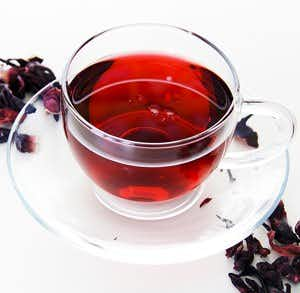
Does your doctor frown over your blood pressure? Sometimes blood pressure is higher in the office than at home. (This is called “white-coat hypertension.”) But if your pressure is starting to climb even when you aren’t sitting in the doctor’s office, you may wish to take action to bring it down. Prompt action might help you avoid prescribed antihypertensive medicine. Perhaps you could start by sipping hibiscus tea. Does this natural approach have side effects?
Hibiscus Lowered Blood Pressure But Caused Insomnia:
Q. I have had rather high blood pressure for about ten years. I get unpleasant side effects from most medications. For example, some made me cough until I vomited. I have also had swelling of my face and/or throat, sometimes my ankles. Insomnia, constipation, falling-down dizziness and extreme fatigue are other reactions I’ve suffered.
I’ve seen various doctors, including a cardiologist, who have told me that I just have to live with the side effects. They have nothing else to offer.
In my desperate attempt to find natural alternatives, I’ve tried many things. Nothing much worked until I discovered hibiscus tea. Three cups a day brought my systolic number down by almost 30 points.
Sipping Hibiscus Tea Triggers Reader’s Insomnia:
There’s a big problem for me, though: hibiscus tea gives me terrible insomnia. I mean I’m still wide awake at 7 am, and melatonin at bedtime doesn’t help.
It’s not a coincidence. I’ve tried going on, then off, the hibiscus several times. I always get insomnia while taking it but start sleeping again a few days after I’ve gone off.
I’ve searched the Internet but can find no one else who has had this experience or any explanation for it.
A. We too are puzzled. We don’t really know why hibiscus gives you insomnia, and we couldn’t find any reference to this reaction in the medical literature.
What we have found is that Hibiscus sabdariffa acts on the same biochemical pathway as lisinopril and other ACE inhibitor blood pressure pills (Indian Journal of Pharmacology, Sep-Oct. 2015). Since some of those blood pressure pills also gave you insomnia, perhaps you are reacting to this biochemical process.
You may want to consider adopting DASH (dietary approaches to stop hypertension). This eating pattern has been shown in many well-controlled studies to lower blood pressure. You can find more information about it online.
Another possibility includes beets and/or beet juice. There is considerable scientific support that this vegetable lowers blood pressure (Biomolecules, Nov. 2, 2018). It works through a different mechanism than hibiscus.
Husband Lowered Blood Pressure Sipping Hibiscus Tea:
Q. My husband’s blood pressure was creeping up when I read your article on drinking hibiscus tea to lower blood pressure. He has been drinking three cups of Tazo Passion tea with hibiscus every day since then and his blood pressure has gone back to the normal range!
Thank you so much. It’s great to be able to avoid a medication. I shared this info with his doctor; she said she wasn’t familiar with it and wanted the article, as she too is interested in non-pharmaceutical fixes when ever possible.
Nondrug Alternatives for Blood Pressure Control:
A. We’re delighted that your husband’s doctor is interested in evidence-based nondrug alternatives. Hibiscus has a long history as a folk remedy, but there is substantial research on its ability to help control blood pressure (Al Disi, Anwar & Eid, Frontiers in Pharmacology, Jan. 19, 2016).
This lovely red flower works in part by making blood vessels more flexible and by blocking a compound called angiotensin converting enzyme (ACE). That means sipping hibiscus tea works somewhat like popular blood pressure pills such as lisinopril. In fact, a small study found that it has comparable effectiveness.
Anyone who would like to know more about other nondrug approaches may find our Guide to Blood Pressure Treatment helpful.
Citations
- Nwachukwu DC et al, "Effects of aqueous extract of Hibiscus sabdariffa on the renin-angiotensin-aldosterone system of Nigerians with mild to moderate essential hypertension: A comparative study with lisinopril." Indian Journal of Pharmacology, Sep-Oct. 2015. DOI: 10.4103/0253-7613.165194
- Bonilla Ocampo DA et al, "Dietary nitrate from beetroot juice for hypertension: A systematic review." Biomolecules, Nov. 2, 2018. DOI: 10.3390/biom8040134
- Al-Disi SS et al, "Anti-hypertensive herbs and their mechanisms of action: Part I." Frontiers in Pharmacology, Jan. 19, 2016. doi: 10.3389/fphar.2015.00323

